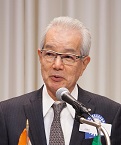Do You Remember the ��Sunday Project��?
18 October, 2017
Mr. Shoichi Wada
Corporate Advisor, Asahi Broadcasting Corporation
�� Based on my work experience at Asahi Broadcasting Corporation, let me first talk about the advertising business, public relations and then about the TV program I produced, the ��Sunday Project��.
Based on my work experience at Asahi Broadcasting Corporation, let me first talk about the advertising business, public relations and then about the TV program I produced, the ��Sunday Project��.
��Advertising expenditures in Japan total 6 trillion yen, accounting for over 1% of its GDP. TV advertising has been about 2 trillion yen for many years, yet the latest ��Ad Spend Forecasts�� says that the Internet advertising market will outgrow TV advertising sometime next year. As for last year, Internet advertising expenditures in Japan totaled 1.3 trillion yen, accounting for two-thirds of TV advertising. Yet its growth rate of 13% is nearly 8 times higher than that of TV advertising. It is no surprise that major TV broadcasters in Tokyo gear towards Internet business, including the Japan Broadcasting Corporation providing over-the-air broadcasting and live internet streaming.
��Now, when it comes to public relations, organizations must be ready to respond to any crisis quickly and efficiently, based on a comprehensive crisis-management strategy. Your response can either boost your image or significantly damage your brand. A prominent crisis-management specialist Mr. Atsuyuki Sassa repeatedly emphasized in the TV program ��Sunday Project�� that the essence of crisis-management is to ��prepare pessimistically and respond optimistically��. If we are fully prepared for the worst case scenario, we can respond in a calm orderly manner. In this age of social media, news travels fast especially when it is bad news. Whistleblowing that reports corporate wrongdoing or inappropriate behaviors will put corporate management under public scrutiny and trigger a serious PR crisis. The company I worked for had set a fundamental principle of ��never cover up�� corporate scandals to avoid devastating consequences.
��Let me now talk about ��Sunday Project,�� a live TV program aired from 1989 to 2010 on Sunday mornings. I was a producer for the first 4 years. The program gained popularity as a forum for open political debate with Mr. Soichiro Tahara, a renowned political journalist, asking incisive questions to prominent politicians. Mr. Tahara was often criticized for not listening to others but his adamant attitude and straightforward questions often got down to the core issues the audience really wanted to hear about. He was not deceived by politicians�� self-justifying theories or superficial sweet-talk. Among many prominent politicians who appeared on the program were the so-called ��YKK trio�� Mr. Taku Yamazaki, Mr. Koichi Kato and Mr. Junichiro Koizumi. ��Sunday Project�� was the first program that all three appeared together. They publicly criticized the then Prime Minister Toshiki Kaifu and his administration which eventually led to his resignation in 1991.
��A ��Sunday Project�� reported the latest developments during the Gulf War which broke out in 1991 and maintained high audience rating by providing precise analysis given by experts, analysts, critics and politicians. During one month, we received interviews from 8 journalists all themed on the same question of ��whether TV has overtaken newspapers��. The Gulf War was nicknamed ��Video Game War�� due to extensive live coverage of the attacks by the Coalition Forces. TV played an instrumental role in providing real-time information with detailed analysis, while newspapers seemed to lag behind in timeliness. By the time newspaper subscribers received their morning or evening papers, not a few people found the situations had changed significantly. Today, 26 years from the Gulf War, we come to wonder ��whether the Internet has overtaken TV in news reporting��.
����Sunday Project�� documentary featuring on North Korea was produced by a journalist of Asahi Broadcasting Corporation Mr. Kenji Ishidaka. Based on thorough research and extensive interviews, his documentary Between the Dark Waves: North Korea��s Espionage Project debunked a startling story of Mr. Tadaaki Hara being abducted by a North Korean spy Shin Kwang Soo. This groundbreaking documentary served to shed light on the abduction issue and was a wake-up call for many Liberal Democratic Party members to realize the magnitude of such inhumane acts. Mr. Ishidaka also uncovered the abduction of Ms. Megumi Yokota and contacted her parents to share his findings.
��In its 21 years of broadcasting, ��Sunday Project�� focused on inviting people related to each issue and getting the truth out of them by sharp questions posed by the interviewer Mr. Tahara. Based on comprehensive in-depth research and first-hand reports from actual sites, the program aimed to get down to the true stories behind the scenes. While the program often made critical comments on the government, Mr. Tahara made it clear to offer constructive counter proposals by tapping into an extensive network of prominent experts. The ultimate goal of ��Sunday Project�� was to attract public interest in politics by encouraging politicians to come forward to engage in sincere discussion in front of the camera, instead of engaging in backroom deals made at high-end Japanese restaurants. I look forward to watching a new series of ��Sunday Project�� in this new era.